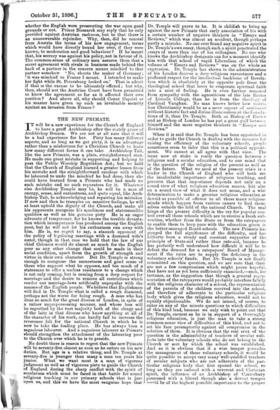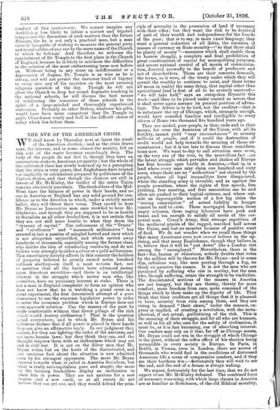THE NEW PRIMATE.
IT will be a new experience for the Church of England to have a gruff Archbishop after the stately grace of Archbishop Benson. We are not at all sure that it will be a bad. experience for her. Piety has many different aspects, and so long as we get piety, it is an advantage rather than a misfortune for a, Christian Church to learn how many different forms it can take. Archbishop Tait, like the new Primate, was a plain, straightforward man. He made one great mistake in supporting and helping to pass the Public Worship Regulation Act; but we hold that the Church of England learned a greater lesson from his mistake and the straightforward candour with which he laboured to undo the mischief he had done, than she could have learned from a Primate who had made no such mistake and no such reparation for it. Whatever else Archbishop Temple may be, he will be a man of energy, sense, and earnestness, and quite equal, like Arch- bishop Tait, to acknowledging and repairing his mistakes. If now and then he tramples on sensitive feelings, he will at least uphold the dignity of the Church, and make all his opponents recognise his manliness and statesmanlike qualities as well as his genuine piety He is an eager advocate of temperance, for he knows the terrible devasta- tion which intemperance has produced among the English poor, but he will not let his enthusiasm run away with him. He is, we regret to say, a staunch opponent of the policy of legalising marriage with a deceased wife's sister, though in that case we hold that the law of our chief Colonies would do almost as much for the English poor as any other change that could be made in their social condition, apart from the growth of strength and virtue in their own character. But Dr. Temple is strong enough to recognise the earnestness and good sense of those who support what he opposes, and too much of a statesman to offer a useless resistance to a change which is not only coming, but is coming from a deep respect for marriage and the desire to remove all restrictions which render our marriage-laws artificially unpopular with the masses of the English people. We believe that Englishmen will find in Dr. Temple what is called a rough diamond, perhaps not the worse for being rough. A man who has done so much for the great diocese of London, in spite of a rather unprepossessing manner, and whose loss will be regretted by the vast majority both of the clergy and. of the laity in that diocese who know anything at all of the character of his work, can hardly fail to increase the reverence felt for the national Church in which he is now to take the leading place. He has always been a sagacious labourer. And a sagacious labourer as Primate should strengthen the attachment of the labouring poor to the Church over which he is to preside.
No doubt there is reason to regret that the new Primate will be seventy-five almost as soon as he enters on his new duties. But age is a relative thing, and Dr. Temple at seventy-five is younger than many a man ten years his pinion What we want most is a man of vigorous judgment as well as of vigorous piety to guide the Church of England during the sharp conflict with the spirit of secularism which must be faced in that battle for sound religious teaching in our primary schools that is just upon us, and this we have the most sanguine hope that Dr. Temple will prove to be. It is childish to bring up against the new Primate that early association of his with a certain number of negative thinkers in "Essays and Reviews," which was almost an accident, though perhaps partly a mistake. No one ever found any negative spirit in Dr. Temple's own essay, though such a spirit penetrated the essays of more than one of his colleagues. No one who knows the Archbishop designate can for a moment identify him with that school of vapid Liberalism of which the volume of "Essays and Reviews" was on the whole an expression. Dr. Temple has shown in the acIministratiod of his London diocese a deep religious earnestness and a profound respect for the intellectual backbone of Revela- tion which is absolutely at the opposite pole from the theological school that loves to evaporate spiritual faith into a mist of feeling. He is even further removed from sympathy with the agnosticism of the late Rector of Lincoln College, than he is from the theology of Cardinal Vaughan. No man knows better how worth- less Christianity would be as a, mere vapour of sentiment without historic fact and. divine illumination at the founda- tions of it, than Dr. Temple. Both as Bishop of Exetei and as Bishop of London he has put a great gulf between himself and the more negative thinkers in "Essay s and Reviews."
When it is said that Dr. Temple has been appointed in order to guide the Church in dealing with the measure for raising the efficiency of the voluntary schools, people sometimes seem to infer that this is a political appoint- ment. We cannot at all agree with that view. The issue now at stake is really the question between a religious and. a secular education, and to our mind that is the question of the religion of the present as well as of the future. What we need at the present crisis is a leader in the Church of England who will both see the incalculable importance of religious teaching, and perceive that that importance depends not only on a sound view of what religious education means, but also on a sound. view of what it does not mean, and a wise determination to make a genuine religious education as devoid as possible of offence to all those many religious minds which happen from various causes to find them- selves outside the fold of the national Church. The real hinge of the present difficulty is the cry for popular con- trol over all those schools which are to receive a fresh sub- vention, whether from the State or from the ratepayers. to enable them to keep pace with the education given in the better-managed Board-schools. The new Primate has gauged the full significance of the difficulty, and has hitherto been a steady and constant supporter of the principle of State-aid rather than rate-aid, because he has perfectly well understood how difficult it will be to defeat the demand for a ratepayers' Board of Manage. ment if the rates are to supply the deficiency in the voluntary schools' funds. But Dr. Temple is not finally committed on this question, and we are sure that there are not a few compromises which might prove hopeful, that have not as yet been sufficiently examined,—such, for instance, as the suggestion that though a, general repre- sentation of the ratepayers would probably interfere fatally with the religious character of a school, the representation of the parents of the children received into the school, and. therefore of adherents to the particular religious body which gives the religious education, would not be equally objectionable. We do not intend, of course, to enter on any of the minute questions to which difficulties of this kind lead, because we only wish to point out that Dr. Temple, earnest as he is in support of a thoroughly religious education, is just the man to take a strong common-sense view of difficulties of this kind, and not to set his face peremptorily against all compromise in the solution of them. It is obvious that tke real crux of the question is the admissibility of teachers of secular sub- jects into the voluntary schools who do not belong to the Church or sect by which the school was established. And as it is obvious that if a wise temper pervades the management of these voluntary schools, it would be quite possible to accept very many well-qualified teachers of secular subjects who are not adherents of the par- ticular religious body that first opened the school, so long as they are imbued with a reverent and Christian spirit, the influence of an Archbishop of Canterbury possessed with a liberal though also a devout temper moold be of the highest possible importance to the proper • conduct of this controversy. We cannot imagine any Archbishop less likely to infuse a narrow and bigoted temper into the discussion of such matters than the future Primate, for he is not only a practical man, but a man entirely incapable of wishing to measure the general piety and moral calibre of any one by the mere name of the Church to which he belongs. And therefore we welcome the appointment of Dr. Temple to the first place in the Church of England, because he is likely to minimise the difficulties in the solution of the most embarrassing issue now before us. Without being in any sense an indifferentist or a depreciator of dogma, Dr. Temple is as wise as he is strong, and will not permit the narrower kind of bigotry to creep into any of his speeches on the most pressing religious question of the day. Though he will not allow the Church to drop her sound dogmatic teaching in the national schools, he will discuss the best means of reinforcing the resources of those schools in the spirit of a large-minded and thoroughly experienced statesman. Probably no other Bishop, whatever his gifts, would have been more competent than Dr. Temple to guide Churchmen wisely and well in the difficult choice of policy which lies before them.











































 Previous page
Previous page